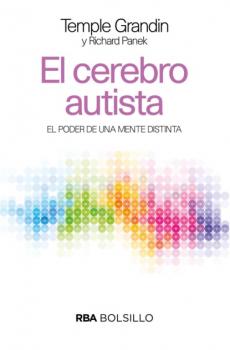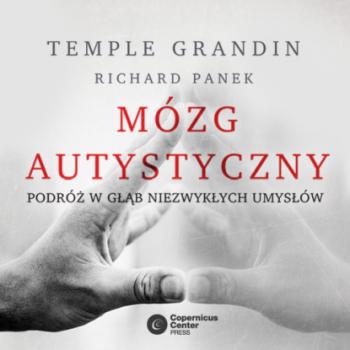Temple Grandin
Список книг автора Temple GrandinEl lenguaje de los animales
CÓMO ESCUCHAR LO QUE LOS ANIMALES QUIEREN DECIRNOS¿Qué sienten los animales? ¿Qué piensan? ¿Cómo ven el mundo? A veces no nos damos cuenta de que, para enten¬derlos, debemos cambiar radicalmente nuestra perspectiva humana. Como científica experta en conducta animal y tam-bién como persona con autismo, Temple Grandin propone otras vías para establecer un fuerte vínculo emocional entre los seres humanos y el mundo animal, invitándonos a inter¬pretar su forma de comportarse y expresarse desde otros puntos de vista, no solo desde el nuestro."Un libro profundamente conmovedor y fascinante". OLIVER SACKS
El cerebro autista
Las personas autistas perciben y entienden el mundo de una manera radicalmente diferente. Los últimos avances médicos en neuroimagen y genética nos han acercado a comprender la singular perspectiva de un cerebro autista, pero faltaba una voz autorizada que pudiera aplicar esos conocimientos y explicarlos desde dentro. En este libro único, Temple Grandin, profesora universitaria y una de las autistas más famosas del mundo, nos ofrece ese conocimiento desde un punto de vista científico, pero, sobre todo, desde su valiosa experiencia vital.
Asperger's and Girls
Winner of the Gold Award in the 2006 ForeWord Book of the Year competition, this groundbreaking book describes the unique challenges of women and girls with Asperger’s Syndrome. In it you’ll read candid stories written by the indomitable women who have lived them. You’ll also hear from experts who discuss whether Aspie girls are slipping under the radar, undiagnosed; why many AS women feel like a minority within a minority (outnumbered by men 4:1); practical solutions school systems can implement for girls; social tips for teenage girls, navigating puberty, the transition to work or university, and the importance of careers.
Helpful chapters include:
The Pattern of Abilities and Development of Girls with Asperger’s Syndrome
Asperger’s Syndrome in Women: A Different Set of Challenges?
Educating the Female Student with Asperger’s
Girl to Girl: Advice on Friendship, Bullying, and Fitting In
Preparing for Puberty and Beyond
The Launch: Negotiating the Transition from High School to the Great Beyond
Aspie Do’s and Don’ts: Dating, Relationships, and Marriage
Maternal Instincts in Asperger’ Syndrome
For Me, a Good Career Gave Life Meaning
Different . . . Not Less
This book is a compilation of success stories from adults with autism and Asperger's Syndrome. Each shares what helped them during their childhood and young lives that made them the independent adults they are today. One of the most important missions Temple Grandin has is making sure people with autism and Asperger's make something of their lives. As Temple says quite bluntly, being on Social Security is NOT a job choice. These unique individuals often have great potential in parts of their minds that neurotypicals never even start to tap. This needs to be shared with the world. However, in order to share their hidden genius, they have to overcome many social obstacles. The point of this groundbreaking work is – it is possible, and it is WORTH it. Let these crusaders, handpicked by Temple herself, show how it can be done. Let this work by Dr. Temple Grandin inspire you to your true potential. You will soon see why it means so much to her.
Bright Not Broken. Gifted Kids, ADHD, and Autism
The future of our society depends on our gifted children—the population in which we’ll find our next Isaac Newton, Albert Einstein, or Virginia Woolf. Yet the gifts and talents of some of our most brilliant kids may never be recognized because these children fall into a group known as twice exceptional, or “2e.” Twice exceptional kids are both gifted and diagnosed with a disability—often ADHD or an Autism Spectrum Disorder—leading teachers and parents to overlook the child’s talents and focus solely on his weaknesses. Too often, these children get lost in an endless cycle of chasing diagnostic labels and are never given the tools to fully realize their own potential. Bright Not Broken sheds new light on this vibrant population by identifying who twice exceptional children are and taking an unflinching look at why they’re stuck. The first work to boldly examine the widespread misdiagnosis and controversies that arise from our current diagnostic system, it serves as a wake-up call for parents and professionals to question why our mental health and education systems are failing our brightest children. Most importantly, the authors show what we can do to help 2e children, providing a whole child model for parents and educators to strengthen and develop a child’s innate gifts while also intervening to support the deficits. Drawing on painstaking research and personal experience, Bright Not Broken offers groundbreaking insight and practical strategies to those seeking to help 2e kids achieve their full potential. Diane M. Kennedy, author of The ADHD-Autism Connection, is a long time advocate, international speaker/trainer, and mother of three twice-exceptional sons. Rebecca S. Banks, M.A., co-author of The ADHD-Autism Connection, is a veteran educator, national speaker/trainer, and mother of two twice-exceptional children. Temple Grandin, Ph.D., is a professor, prolific author, and one of the most accomplished and renowned adults with autism in the world.
Autism. Diagnoosimise alused ja suhtumine autistidesse
"Sõnal „autism” on ka praegusel ajal paljude inimeste jaoks kohutav tähendus: silme ette tulevad kõnetud, stereotüüpidega, karjuvad, kontaktivõimetud lapsed, ning enamik inimesi ei mõtle selle peale, milline saab olema nende laste tulevik. Samuti ei tea me veel siiani piisavalt põhjalikult autismispektri häirete põhjuste kohta. Selle raamatu autor Temple Grandin on ise autistlik inimene, kes on oma nõrkusi ja tugevusi tundma õppinud, nii et ta on elus hästi hakkama saanud: leidnud töö, lõpetanud ülikooli, saanud teadlaseks, ning ta on uurinud kogu elu autismi olemust ja põhjusi. Ta jagab selles raamatus soovitusi, kuidas keskenduda autismispektri häiretega laste tugevustele, kuidas toetada nende arengut, haridusteed ja kuidas leida neile töövõimalusi. Tema kogemuste kirjeldused ja mitmekesised soovitused on väga väärtuslikud kõikidele autistlike laste vanematele, aga ka kõigile spetsialistidele, kes töötavad nende lastega. Arvestades kõiki neid selle raamatu teemakäsitlusi, saaks ka meie haridussüsteem pakkuda autismispektri häirega lastele just neile sobivaimat õppimisvõimalust. Autorite nõuanded selle kohta, kuidas aidata autistlikel lastel elus toime tulla, on sedavõrd elulised ja realistlikud, et need võiks juhendmaterjalina kaasa anda kõikidele vanematele, kui nende laps saab autismispektri häirete diagnoosi. Mida rohkem me saame teada autistliku aju eripäradest ja sellest, kuidas kaasaegseid uuringuid ära kasutada, seda paremini suudame me leida nendele lastele paremaid võimalusi toimetulekuks. Temple Grandin on väga hea eeskuju kõikidele autismispektri häirega inimestele – tema elukäik näitab, mida on võimalik saavutada suure töö ja realistliku lähenemisega. Me kõik ju soovime autismispektri häirega lastele just samalaadset tulevikku – iseseisvat toimetulekut ja täisväärtuslikku elu – ning see raamat aitab meil selle poole püüelda.








